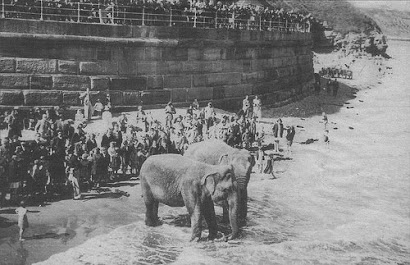
MARIANNE REBECCA JOHNSON
In 1807 a Master Bricklayer working in Bishopsgate, London saw what he thought was a sailor boy sitting in a doorway in a very sorry state. The youth was drenched with rain, shivering with cold and weeping inconsolably.
The man questioned the boy on his situation and discovered that he had run away from a northern coal ship, now in Pool, on which he had served a four year apprenticeship. He avowed that he would rather face the hangman's noose than return on board.
The pair went to The Bull's Head for rest and refreshment, but on entering the inn the lad fainted through fatigue and hunger upon the stone floor. On loosening his neck-handkerchief and opening his shirt to aid resuscitation, the sailor's true sex became apparent.
The hostess of The Black Bull took the girl under her benevolent wing, displaying great understanding and kindness. At length the following narrative emerged:
She was a native of Whitby named Marianne Rebecca Johnson whose Father had died in the service of his country. Her Mother remarried another man and the family continued to live in Whitby. One day whilst at work in the town, her Stepfather took her away and forced her to don sailor's attire. He threatened to murder her if she ever disclosed her true sex, and he bound her up as an apprentice on the coal ship Mayflower of Sunderland, on which she served for four years without her true gender ever coming to light. She was known as William Johnson.
On the Monday prior to her discovery, she was ill and in a very delicate situation. Thinking her lazy and insolent, the mate had her severely flogged. On the Tuesday morning with cunning and determination she made good her escape.
It turned out that the girl's Father had treated her Mother in a similar way. She too had been forced into sailor's clothes, and with her hair cropped enrolled on board a ship of war .
She served for seven years before being mortally wounded in the late taking of Copenhagen(August 16th-September 5th 1807). A letter written just before her death to a friend in Whitby made clear the circumstances of her fate. She clearly preferred the hardship of a life at sea to the chance of ever meeting her brutal husband again.
Marianne Rebecca Johnson was just seventeen.

THOMAS STEWART
One day in 1860 a jolly looking sailor boy calling himself Thomas Stewart took lodgings in the Royal Princess Inn, Church Street, Whitby. Several other seamen were in the bar and the drinks were flowing freely, as they do on such occasions. As the night wore on, being suitably inebriated and in pleasant company, he began to display his unusual vocal prowess.
It was all going well until the party spilled out onto Church Street. A passing police constable noticed that the lad's voice and appearance betrayed a certain feminine quality.
The constable accompanied the sailor to his lodgings, and the landlady confirmed that there were good grounds for suspicion. Being drunk and extremely foul mouthed, the sailor was locked in a cell overnight. In the morning a doctor confirmed the diagnosis.
The girl claimed to be a native of Glasgow whose Mother was dead and whose Father had drowned at sea. Having four sailor brothers, at the age of twelve she too decided on a career at sea. She enrolled on a ship bound for Australia. For five years she followed her chosen occupation, her last voyage being aboard The Morning Star.
She was brought before the Magistrate, who noted the blackness of her teeth from smoking and chewing tobacco, and her comprehensive seafaring knowledge. She was keen to obtain another voyage of eighteen months. She thought then she would have saved enough to purchase some petticoats and follow a calling more becoming of a female.
It was recommended that she was seen safely out of town and given 3 shillings out of the box. However she was reported drunk again the same evening at Upgang, and likewise the following day at Hinderwell.
She too was seventeen years of age.




.jpg)


